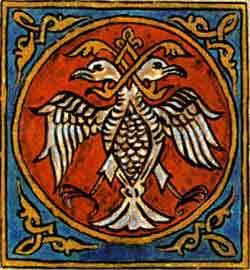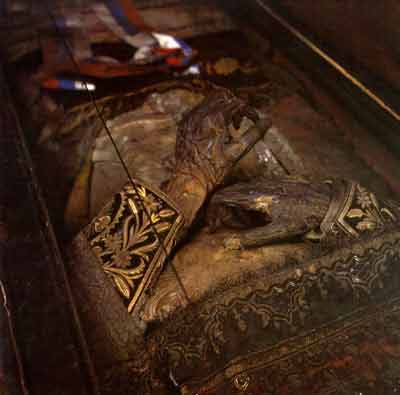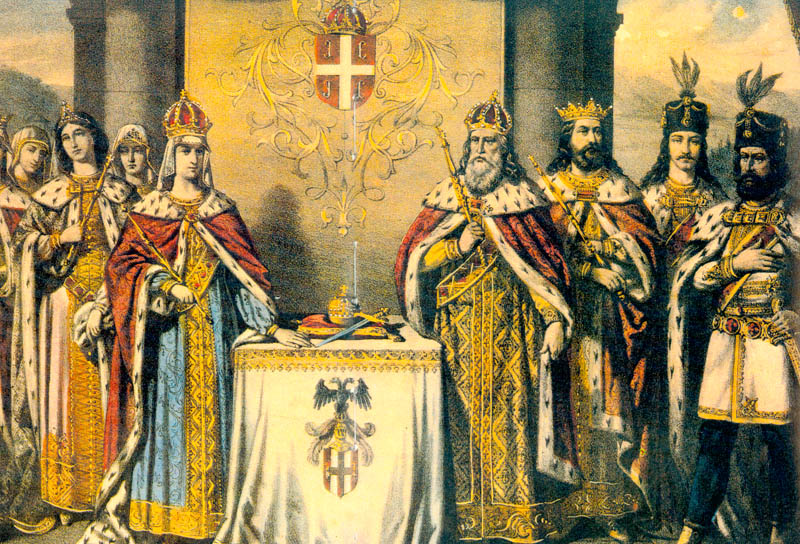

 |
 |
TZAR LAZAR

Stefan Lazar Hrebeljanović Knez Lazar (1329 – June 28, 1389, Gregorian Calendar), also known as "Tsar Lazar", was a Serbian noble who fought and perished at the Battle of Kosovo, to which his name and life are inextricably tied. He is a heroic figure in Serbia, and a saint of the Serbian Orthodox Church.
Lazar was born in Prilepac (close to Novo Brdo) in 1329, the son of imperial chancellor Pribac Hrebeljanović to a family originating for the Grbalj coastal clan. He was educated at Tzar Dušan's court in Prizren. He was later promoted to knez by Dušan's successor Tzar Stefan Uroš V. Despite his imperial title, Uroš was a weak and ineffectual leader, allowing local nobles to gain power and influence at the expense of the central authority.
Lazar left Prizren in the early 1370s, and devoted himself to the consolidation of his power in the northern Serbian regions around his court in Kruševac. Although a pledged vassal to Stefan Uroš, in 1371 he refused to participate in the Battle of Marica, at which the bulk of the imperial Serbian army was destroyed by an Ottoman force. Soon afterwards, Stefan Uroš died. He had been the last of the Nemanjić emperors. Through a combination of diplomacy, military action, and family alliances, Lazar emerged from the resulting power vacuum as the most powerful Serbian noble not in the Ottomans' service. He acquired dynastic legitimacy by marrying Milica Nemanjić, and despite retaining only the minor title of knez, he nevertheless used the imperial name of 'Stefan' as well as the designation "autocrator". At the same time, he took no issue with Bosnian ban Tvrtko (whose Nemanjić lineage was in any case much stronger than Lazar's) proclaiming himself "King Stefan of Serbs and Bosnia". In this way Lazar could retain the de facto power, while ceding only a ceremonial title to Tvrtko, who never managed to revive the old Nemanjić institutions of central power.
The first mention of any Ottoman movement into Lazar's territory is from a chronicle entry of 1381, when two of Lazar's subjects, Vitomir and Crep, defeated the Turks on the Battle of Dubravnica River near Paracin. After that there is no record of any hostility between Lazar and the Turks until 1386. Lazar mobilized several other Serbian nobles, including Tvrtko, King of Bosnia, and in 1386. smashed Murat's general Timurtash at Battle of Plocnik, forcing the Ottomans south to Nis
Around 1380 Lazar founded the monastery of Ravanica and around 1388 Ljubostinja. By 1387 he was raising a massive force to meet the invading forces of the Ottoman Empire, which would include every Serbian knight in his kingdom. The two large forces met in the 1389 battle of Kosovo, and Lazar was one of those killed during that battle, along with much of Serbia's political elite.

Tzar Lazar's relic
Following Lazar's death, his widow assumed control of Serbia. Lacking in military or economic strength, she pledged suzerainty to Murad I's successor, his son Bayezid, who had taken as his wife the daughter of Lazar. Meanwhile, Milica turned to internal matters, where she dealt with her few remaining political opponents. It was her propaganda campaign, via the epic poetry composed at her court, that resulted in Lazar's quick resurrection, and the subsequent portrayal of their son-in-law Vuk Branković as the traitor responsible for the Serbian defeat.
In Serbian legend, Lazar is said to have been visited by an angel of God on the night before battle, and offered a choice between an earthly or a Heavenly kingdom, which choice would result in a peaceful capitulation or bloody defeat, respectively, at the Battle of Kosovo.
"...Prophet Elijah then appeared as a gray falcon to Lazar, bearing a letter from the Mother of God that told him the choice was between holding an earthly kingdom and entering the kingdom of heaven..."
Lazar opts for the Heavenly kingdom, which will last "forever and ever" ("Perishable is earthly kingdom, but forever and ever is Kingdom of Heaven!" - Serbian: "Земаљско је за малена царство, а Небеско увијек и довијека!"), but has to perish on the battlefield. “We die with Christ, to live forever”, tells he to his soldiers. That Kosovo’s destination and that Testament, it is a union which Serb people made with God – and sealed it with martyrs’ blood. On Kosovo Serbs voted with their souls for Kingdom of Heaven and that was and has been their right destination. Since then all Serbs truthful to that Testament are becoming people of God, Christ’s New Testament nation, heavenly Serbia, part of God’s New Israel. This is why sometimes Serbs refer to themselves as the people of Heaven ("Небески народ").
Serbian Orthodox Church canonised Lazar as Saint Lazar. He is celebrated on June 15 in the Julian calendar (Vidovdan), which during the 20th and 21st centuries is June 28 in the Gregorian calendar. (In the nineteenth century, June 27 equaled June 15 in the Julian Calendar, in the eighteenth century, June 26 equaled June 15 in the Julian Calendar, and so forth). Several small Serbian Orthodox Church churches and missions throughout the world are named after him. His alleged remains are kept in Ravanica Monastery where miraculous cures have been attributed to them.
Lazar married Milica in around 1353 and issued at least seven children:

Tzar Lazar and Tzaritza Milica
1. Mara (Марa): died April 12, 1426, married Vuk Brankovic in around 1371
2. Stefan Visoki (Стефан Високи) (around 1377 - July 19, 1427, buried in Manasija monastery), prince (1389-1402) and despot (1402-1427) , married in 1405 Jelena, daughter of Francesco II
of Lesbos (1384-1404).
3. Vuk, prince, executed on July 6th 1410
4. Mara or Dragana, died before July 1395, married Bulgarian tsar Ivan Shishman in around 1386
5. Teodora, died before 1405, married Nikola II Gorjanski (who died 1433) (Nikola II Gorjanski jr. (Никола II Горјански Млађи), son of Nikola I Gorjanski (Никола I Горјански), ban of
Mačva since 1387, ban of Croatia since 1394, Hungarian Palatin since 1401)
6. Jelena or Jela, died March 1443, married
1. Đurađ Stracimirović (Ђурађ Страцимировић), one of Balsics
2. Sandalj Hranić (Сандаљ Хранић) Kosača (Косаче)
7. Olivera Despina (Оливера Деспина) born 1372 died after 1444, married Ottoman Sultan Bayezid I in 1390
 |
 |
 |
 |
 |
 |